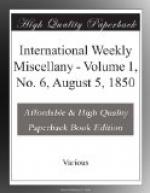“Such facts as these should not be lost sight of at the present day—such an example it is well to refer to now, in the day of our prosperity. And we would ask—in no ill-natured or censorious spirit, but rather that the lessons of history should not be forgotten—how many young men of these days under like circumstances, would make a similar sacrifice upon the altar of their country? The solemn and impressive event which has produced this notice seems to render this question not entirely inappropriate; for years should not dim in the minds of the rising generation the memory of those pure and strong men, who, in the early trials of their country, rose equal to the occasion. When, at a later period, political parties began to develop themselves, Mr. Erving, then a resident of Boston, identified himself with the great republican party, and became actively instrumental in securing the election of Thomas Jefferson to the Presidency. From that time forward until the day of his death, he never faltered in his political faith.
“Few men have been, for so long a period, so intimately connected with the diplomatic history of our country. He received his first public appointment, as Consul and Commissioner of Claims at London, nearly half a century since. This appointment was conferred upon him without his solicitation, and was at first declined. Subsequent reflection, however, induced him to waive all private and personal considerations, and he accepted the post assigned to him. The manner in which he discharged the duties of that trust, impressed the government with the expediency of securing his services in more important negotiations, and he was sent as Commissioner and Charge d’Affaires to Denmark. His mission to the court of that country was, at that period, a highly important one. The negotiations he had to conduct there, required great tact and ability.




